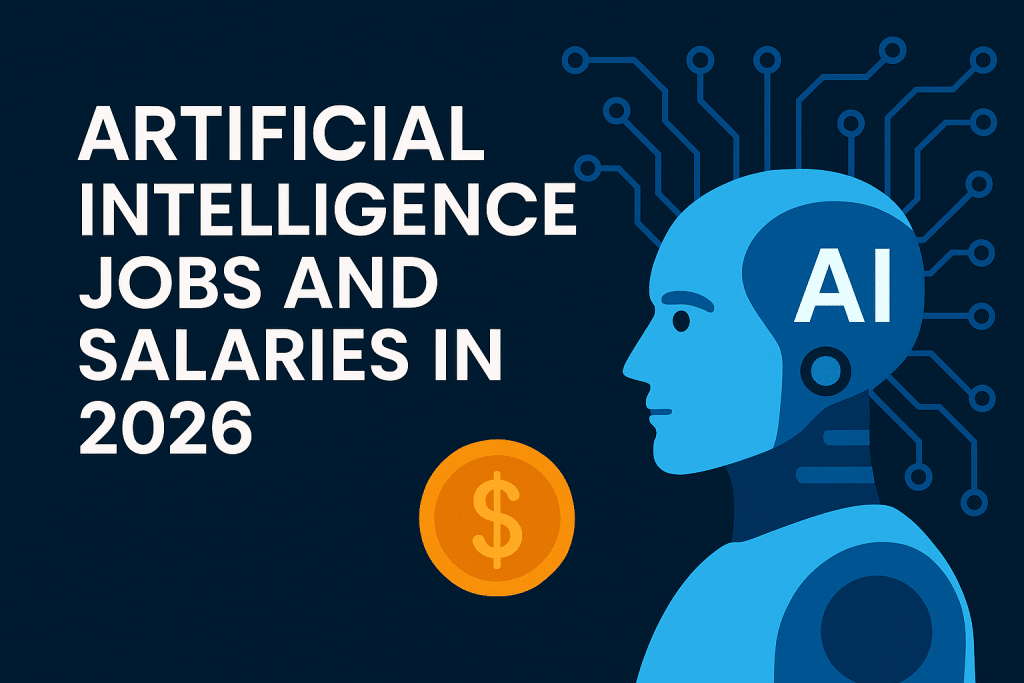TL;DR
- The average annual salary of an Artificial Intelligence professional in the United States is $109,000.
- The average annual salary of an AI-certified professional in Canada is $98,000.
- The average annual salary of an Artificial Intelligence learning professional in the United Kingdom is £82,000 (GBP).
- The average annual salary of an AI-certified professional in France is €59,000 (EUR).
- The average annual salary of an Artificial Intelligence professional in Germany is €66,000 (EUR).
- The average annual salary of an AI engineer in Switzerland is CHF 124,000, the highest among European markets.
- An early-career AI professional earns about $82,000 annually.
- A mid-level AI professional earns around $118,000 per year.
- An experienced or senior-level AI professional earns up to $166,000 annually.
- Job roles in machine learning, data science, and generative AI continue to offer significantly higher salaries across nearly every industry in 2026.
Introduction to AI Salary Trends in 2026
The world of artificial intelligence has moved beyond innovation; it’s now an essential driver of business success. In 2026, companies are investing heavily in AI technologies, machine learning models, and advanced data pipelines to automate decisions, improve data analysis, and increase efficiency. These shifts have made AI professionals some of the highest-paid experts in the world today.
From data scientists to machine learning engineers, organizations are hiring at record levels. Industries such as finance, healthcare, and manufacturing now depend on AI systems for predictive analytics, optimization, and personalized solutions. This growth has also led to sharp salary increases, making artificial intelligence jobs a top career choice for recent graduates, software engineers, and experienced research scientists alike.
Global AI Salary Overview (2026)
| Country | Average Salary (USD Equivalent) | Early Career | Mid-Career | Experienced AI Professional |
|---|---|---|---|---|
| United States | $109,000 | $85,000 | $124,000 | $166,000 |
| Canada | $98,000 | $76,000 | $112,000 | $148,000 |
| United Kingdom | $82,000 | $64,000 | $97,000 | $130,000 |
| Germany | $89,000 | $70,000 | $105,000 | $142,000 |
| Switzerland | $124,000 | $98,000 | $138,000 | $180,000 |
Across these regions, AI engineers and data scientists earn significantly higher than traditional IT roles due to specialized skills in data science, machine learning, and deep learning.
What Is Artificial Intelligence and Why It Pays Well
Understanding AI in the World Today
At its core, artificial intelligence refers to computer systems capable of performing tasks that require human reasoning, data analysis, pattern recognition, problem solving, and predictive modeling. It integrates fields like computer science, statistics, and applied mathematics to create systems that can think and learn autonomously.
AI applications now span data transformation, natural language processing, computer vision, and generative AI, each contributing to new job opportunities and rising average salaries. Companies rely on AI ML integration for smarter workflows, while AI engineers and research scientists maintain data pipelines that support these advanced models.
Key AI Domains Influencing Salary
AI salaries scale with specialization. Professionals with experience in machine learning, deep learning, or prompt engineering earn more because their knowledge drives the creation of machine learning models and AI systems that solve real world challenges.
Top-paying domains include:
- Machine learning models and predictive analytics
- Natural language processing and AI research
- Computer vision and autonomous system design
- Generative AI and prompt engineering for automation
- Reinforcement learning and robotics optimization
You can also explore our detailed comparison of Generative AI vs Predictive AI to understand how these technologies shape modern data-driven systems.
Artificial Intelligence Salary by Experience Level
How Experience Impacts AI Earnings
As AI engineers gain practical experience, their salary growth becomes exponential. Labor statistics show that mid-career experts who have spent five to seven years developing AI products or maintaining data pipelines earn nearly double the pay of their entry level counterparts.
AI Salary by Experience and Job Role
| Career Stage | Avg Years of Experience | Role Examples | Average Salary (USD) |
|---|---|---|---|
| Entry Level | 0–2 years | Junior data scientist, entry level jobs | $82,000 |
| Mid Level | 3–6 years | Machine learning engineer, AI engineer | $118,000 |
| Senior | 7–12 years | Lead data scientist, AI research scientist | $152,000 |
| Director / VP | 12 + years | Vice President, Program Management | $195,000+ |
As professionals gain knowledge, manage data, and improve machine learning pipelines, their earning potential rises substantially.
AI Salary by Industry and Job Title
High-Paying Industries for AI Professionals
AI impacts nearly every industry, but certain sectors reward talent at a much higher rate. Fields like information technology, healthcare, and finance depend heavily on AI systems for automation, data analysis, and decision-making.
Average AI Engineer Salary by Industry
| Industry | Average Salary (USD) | Key Skills Required |
|---|---|---|
| Information Technology | $145,000 | Machine learning models, data analysis |
| Healthcare | $133,000 | Deep learning, data transformation |
| Manufacturing and Automation | $120,000 | Reinforcement learning, AI systems |
| Finance and Banking | $150,000 | Statistical modeling, risk analysis |
| Retail and E-commerce | $110,000 | Customer data pipelines, AI ML |
Top Job Titles with Strong Salary Growth
Roles like AI engineer, machine learning engineer, and data scientist dominate AI jobs listings globally. The rising trend of prompt engineering and generative AI positions adds new layers of career growth and base pay potential.
Other key roles include:
- Software engineer specializing in AI tools
- Natural language processing engineer
- AI research scientist focusing on algorithmic innovation
- Computer vision specialists designing recognition systems
Educational Path and Required Skills
Degrees That Boost AI Career Value
Educational background significantly affects pay. Candidates with a bachelor’s degree or master’s degree in computer science, electrical engineering, or a related field are more likely to land higher-paying roles. Undergraduate degrees in mathematics or applied mathematics also provide a strong foundation for AI work.
Employers value education that demonstrates understanding of data, algorithms, and coding principles, critical for designing and developing scalable AI systems.
Essential Skills and Knowledge Areas
Success in AI careers requires both analytical and technical mastery. Key skills include:
- Data analysis and statistical modeling
- Machine learning and deep learning methods
- Python programming and other programming languages
- Problem solving and intellectual curiosity
- Experience in building and maintaining data pipelines
Top AI Skills vs Average Salary Boost
| Skill | Average Salary Boost | Related Role |
|---|---|---|
| Machine Learning Models | +22% | Machine Learning Engineer |
| Deep Learning | +20% | AI Engineer |
| Python Programming | +18% | Software Engineer / Data Scientist |
| Data Analysis | +16% | Data Scientist |
| Prompt Engineering | +14% | Generative AI Specialist |
These technical abilities lead to measurable salary increases, making continuous learning and workforce development essential for long-term success.
AI Salary by Location (Top Tech Cities 2026)
Regional Comparison of Base Pay
Salary variations are strongly tied to geography. Cities like San Francisco and San Diego pay the highest due to dense startup ecosystems and high cost of living.
Top AI Cities and Average Salary
| City / Region | Average AI Salary (USD) | Dominant Job Titles |
|---|---|---|
| San Francisco | $167,000 | AI engineer, Data Scientist |
| New York | $154,000 | Machine Learning Engineer |
| San Diego | $141,000 | Software Engineer, AI Professional |
| London | $118,000 | AI Research Scientist |
| Berlin | $112,000 | Data Analyst, AI ML Engineer |
Professionals in San Francisco and New York tend to receive higher base pay due to concentration of AI research labs and data science startups.
Factors Affecting Artificial Intelligence Salary
Experience and Education
- Experience directly influences income: more practical experience with data and AI systems means faster promotions.
- Higher education, such as a master’s degree, increases credibility and access to senior-level roles.
Skills and Specializations
- Roles involving computer vision, reinforcement learning, or natural language processing lead to higher average salary.
- Expertise in ai machine learning and statistical analysis improves opportunities for leadership positions.
Certifications and Professional Network
- AI-specific certifications in data science and machine learning are now essential.
- Professionals benefit from joining a professional network, attending industry events, and collaborating on research or freelance projects.
Freelance and Contract Work
- Many professionals pursue freelance projects in AI research, data mining, and automation.
- Contract-based jobs allow AI engineers and data scientists to gain diverse experience across industries while maintaining flexibility.
Emerging Trends in AI Jobs for 2026
Generative AI and Prompt Engineering Roles
The rise of generative AI has transformed how companies approach automation and creativity. Prompt engineering specialists help refine model outputs and develop customized AI systems, making this one of the most promising AI jobs for 2026.
AI and Workforce Development
Governments and organizations are focusing on workforce development to close the talent gap. Continuous education in AI ML and program management ensures that the global AI workforce remains capable of handling rapid technological change.
Real-World Applications and Future Scope
AI’s reach now extends into mechanical engineering, logistics, marketing, and even creative industries. From data transformation in healthcare to AI research in robotics, professionals who adapt to innovative technologies are shaping the next decade of automation.
How Cert Empire Helps AI Professionals Advance
Cert Empire empowers learners aiming to enter or advance within the AI industry. With expertly crafted exam materials and real-world training, it supports AI engineers, data scientists, and machine learning professionals pursuing top certifications.
Frequently Asked Questions (FAQs)
What is the average Artificial Intelligence salary in 2026?
The average artificial intelligence salary in 2026 varies by region and experience. In the United States, professionals earn about $109,000 annually, while senior AI engineers and data scientists can reach over $160,000 with advanced machine learning experience.
Which AI jobs are in the highest demand right now?
The most in-demand AI jobs include data scientist, AI engineer, machine learning engineer, and AI research scientist. Roles focused on generative AI, prompt engineering, and deep learning are rapidly expanding across tech, finance, and healthcare.
Is it hard to start an AI career without a technical degree?
While a bachelor’s degree in computer science or a related field helps, many professionals begin with online AI certifications and practical experience through projects. Consistent learning and hands-on data analysis work can bridge the skill gap effectively.
How much does an entry level AI professional earn?
An entry level AI professional typically earns around $80,000 to $85,000 per year. Recent graduates working as junior data scientists or software engineers can expect a steady increase after gaining experience in data pipelines and AI systems.
Which cities offer the highest base pay for AI professionals?
In 2026, San Francisco leads with average salaries near $167,000, followed by New York and San Diego. High-paying hubs often host major AI research labs and data science companies offering specialized AI careers.
What are the key skills required for a successful AI career?
Essential skills include machine learning, deep learning, data analysis, Python programming, and problem solving. Understanding statistical modeling, data transformation, and programming languages improves both technical confidence and earning potential.
Does a Master’s degree increase AI salary potential?
Yes, holding a master’s degree in artificial intelligence, data science, or computer science typically results in a significantly higher salary. It helps professionals qualify for advanced positions like AI research scientists or machine learning engineers.
How do certifications help in Artificial Intelligence careers?
Professional AI certifications validate knowledge in AI ML, data science, and machine learning models. Platforms like Cert Empire provide verified exam preparation and updated materials that help learners prepare confidently for global exams.
What industries pay the most for AI professionals?
Industries such as information technology, finance, and healthcare pay the highest salaries. These fields depend on data scientists and AI engineers to develop secure, efficient, and automated AI systems for critical business operations.
Are AI and machine learning still in high demand in 2026?
Yes. The demand for AI and machine learning specialists continues to grow across nearly every industry. Organizations need experts to build AI technologies, manage data pipelines, and handle AI research that supports innovation and automation.
What’s the best way to gain practical experience in AI?
Professionals should work on freelance projects, participate in AI research, and join open-source communities. Gaining hands-on practice through data science competitions or internship programs helps in mastering real-world challenges.
How can Cert Empire support my AI career growth?
Cert Empire provides comprehensive AI certification exam materials, detailed PDF practice questions, and a powerful exam simulator. Learners can access curated training resources, prepare at their own pace, and enhance their skills to advance in AI careers globally.
Final Thoughts
The demand for artificial intelligence professionals continues to rise in 2026 as companies rely on AI systems to manage data, automate operations, and solve complex problems. With fields like data science, deep learning, and generative AI driving rapid innovation, skilled AI engineers, data scientists, and machine learning specialists will remain in high demand for years to come.
For anyone passionate about AI technologies, this is the ideal time to invest in education, build practical experience, and pursue globally recognized certifications. Whether you’re targeting an entry-level position or a senior AI research role, the career growth and earning potential are unmatched.
Cert Empire continues to guide professionals through this journey, offering verified exam preparation, practical training, and trusted AI certification support. With the right skills, focus, and preparation, you can lead the future of artificial intelligence careers with confidence.
Blog Sources
- Statista – Artificial Intelligence Market Size and Salary Statistics 2026
https://www.statista.com/topics/3104/artificial-intelligence-ai - World Economic Forum (WEF) – Future of Jobs Report 2026–2026: Demand for AI & Data Roles
https://www.weforum.org/reports/the-future-of-jobs-report-2026 - U.S. Bureau of Labor Statistics (BLS) – Occupational Outlook for Computer and Information Research Scientists
https://www.bls.gov/ooh/computer-and-information-research-scientists.htm - Payscale – Average Artificial Intelligence Engineer Salary 2026
https://www.payscale.com/ - Indeed Salary Data (2026 Update) – AI and Machine Learning Job Salaries by Region
https://www.indeed.com/career/machine-learning-engineer/salaries - Glassdoor – AI, Data Scientist, and Machine Learning Engineer Salary Insights
https://www.glassdoor.com/Salaries/ai-engineer-salary-SRCH_KO0,11.htm - LinkedIn 2026 Jobs on the Rise Report – Top Emerging AI and Data Science Careers
https://www.linkedin.com/pulse/jobs-on-the-rise-2026


























